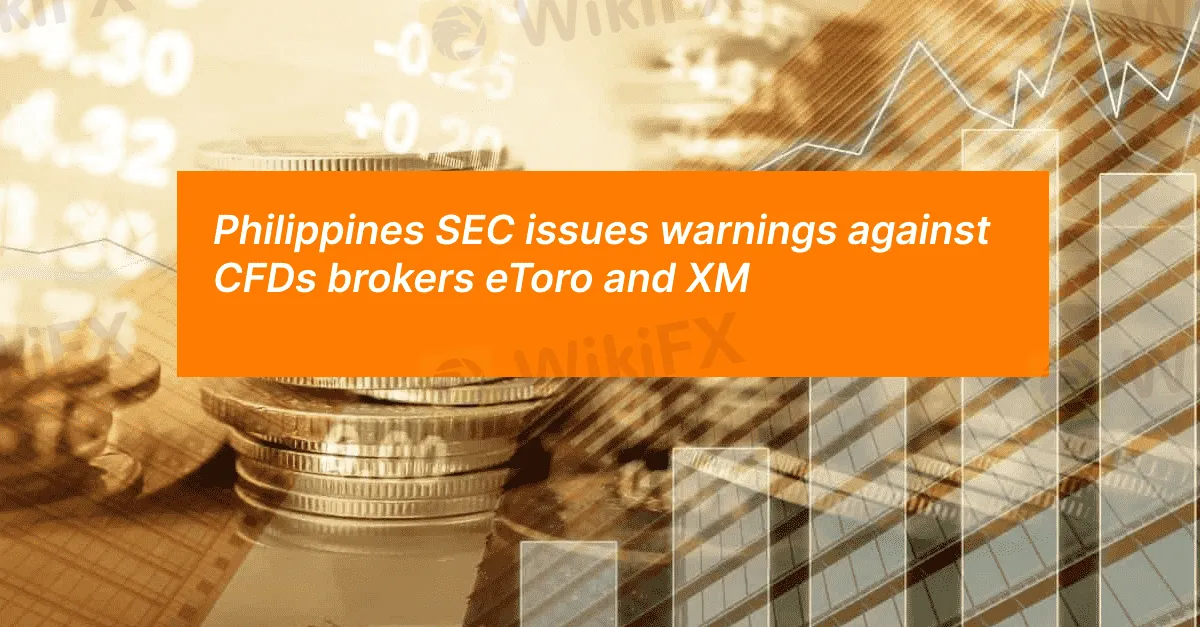简体中文
繁體中文
English
Pусский
日本語
ภาษาไทย
Tiếng Việt
Bahasa Indonesia
Español
हिन्दी
Filippiiniläinen
Français
Deutsch
Português
Türkçe
한국어
العربية
Philippines SEC issues warnings against CFDs brokers eToro and XM
Abstract:The Philippines financial regulator Securities and Exchange Commission (SEC) has issued two advisories this month, warning traders against two retail FX and CFDs brokers, eToro and XM.

The Philippines financial regulator Securities and Exchange Commission (SEC) has issued two advisories this month, warning traders against two retail FX and CFDs brokers, eToro and XM.
The Securities and Exchange Commission (SEC) of the Philippines has recently issued advisories cautioning traders against engaging with two Retail FX and CFDs brokers, namely eToro and XM.
According to the SEC, both eToro and XM have been actively promoting their trading platforms on various social media platforms, targeting Filipinos and enticing them to participate in trading activities.
On WikiFX, XM and eToro both have been given a decent score as they have a long history of forex trading in the markets.


eToro's platform can be accessed via its primary domain, etoro.com, which offers subdomains catering to different countries, including the Philippines, along with mobile applications. Similarly, XM's platform is accessible through its main website, xm.com, and its mobile apps.
While these platforms allow Filipinos to create user accounts for investing and trading, it's important to note that they offer unregistered investment products. In the Philippines, securities and investment products must be registered with the SEC before being offered to the public. This involves a thorough application process, providing detailed information about the securities, and the issuing entity, and obtaining necessary licenses.
Neither eToro nor XM are registered as corporations in the Philippines, and they lack the required licenses to sell or offer securities within the country. As a result, the SEC advises the public to exercise caution when dealing with these unregistered online investment platforms and their representatives.
The Commission emphasizes its previous advisory warning against dealing with non-registered foreign entities and corporations. Additionally, individuals acting as salespersons, brokers, dealers, promoters, influencers, or endorsers of eToro or XM within the Philippines, whether online or offline, may face criminal liability under the Securities Regulation Code (SRC). Penalties include fines of up to Five Million Pesos (approximately USD $88,500) or imprisonment for up to 21 years, or both, as stipulated in Section 73 of the SRC.
Conclusion
In light of these concerns, investors are urged to be vigilant and to verify the registration and legitimacy of any investment platform before engaging with it. If you want to know more information about the reliability of certain brokers, you can open our website. Or you can download the WikiFX APP to find the most trusted broker for yourself.

Disclaimer:
The views in this article only represent the author's personal views, and do not constitute investment advice on this platform. This platform does not guarantee the accuracy, completeness and timeliness of the information in the article, and will not be liable for any loss caused by the use of or reliance on the information in the article.
Read more

OctaFX Flagged by Malaysian Authorities
OctaFX has been officially listed on warning lists by both Bank Negara Malaysia (BNM) and the Securities Commission Malaysia (SC). These alerts raise serious concerns about the broker’s status and whether it is legally allowed to operate in Malaysia.

IronFX Broker Review 2025: A Comprehensive Analysis of Trustworthiness and Performance
IronFX Review 2025: Explore the broker’s AAAA WikiFX rating, global regulations, and $500,000 trading prize. Is it trustworthy or a scam? Dive into our transparent analysis!

TradingPRO: A Closer Look at Its Licences
In an industry where safety and transparency are essential, the regulatory status of online brokers has never been more important. For traders seeking to protect their capital, ensuring that a platform operates under recognised and stringent oversight can make all the difference. Keep reading to learn more about TradingPRO and its licenses.

New SEBI Regulations on Intraday Trading
The Securities and Exchange Board of India (SEBI) has implemented revised regulations on Intraday trading, with effect from November 20, 2024. These regulations are meant to lessen risks and prevent speculative trading practices.
WikiFX Broker
Latest News
SkyLine Guide 2025 Malaysia: 100 Esteemed Judges Successfully Assembled
Vantage Markets Review 2025: Trusted Forex and CFD Trading Since 2009
Why STARTRADER Is Popular Among Traders?
A Guide to Intraday Forex Trading You Can't Miss Out
CONSOB Blocks Access to 13 Unauthorized Investment Websites
TradingPRO: A Closer Look at Its Licences
The world could be facing another ‘China shock,’ but it comes with a silver-lining
New SEBI Regulations on Intraday Trading
Everything You need to know about Barath Trade
IronFX Broker Review 2025: A Comprehensive Analysis of Trustworthiness and Performance
Currency Calculator


